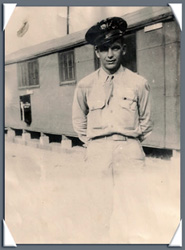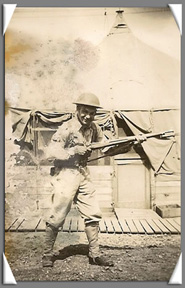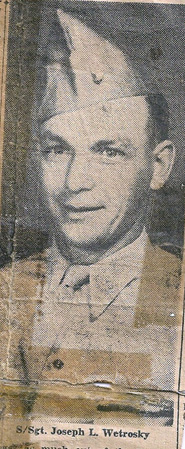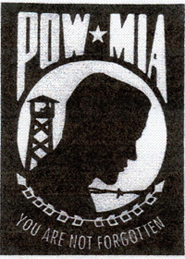PLYMOUTH COUNTY WAR PRISONERS
Joseph J. Wetrosky, living west of Kingsley, received a telegram Monday from the War Department in Washington, D.C., that his son, Joseph L. Wetrosky, was missing in Africa in the period of February 17. He went into the army two years ago, and was among one of the first groups overseas.
Source: LeMars Semi-Weekly Sentinel, Mar. 16, 1943
![]()
KINGSLEY BOY REPORTED GERMAN PRISONER BY RED CROSS
Private First Class Joseph L. Wetrosky, 28, son of Mr. and Mrs. J. J. Wetrosky of Kingsley, missing in action since February 17, is a German prisoner according to word received July 8, by his parents from the Red Cross.
Private Wetrosky lived in Kingsley his entire life and was the first boy from here to be reported missing. He has been overseas since November 1942.
Source: LeMars Semi-Weekly Sentinel, July 16, 1943
![]()
B-7 INFANTRYMAN WORKED HARD, ATE LITTLE AS PW OF GERMANS
Poor food, unsanitary living conditions and seven days a week hard work are the outstanding memories S/Sgt. Joseph L. Wetrosky, B-7, carried away with him after eight months as a prisoner of war of the German army in Italy.
As a rifle-carrying PFC in Co. E., 168th Infantry of the 34th Division, the 30-year-old foot soldier was captured by the Germans near Faid Pass in Tunisia, Feb. 1943, after having fought in the North African campaign from its beginning the Nov. before when he landed at Algiers.
The Germans broke through at the pass, which Wetrosky’s outfit was defending, and his unit was cut off for three days. They fought it out with the Nazis as long as they could, finally some of the Americans decided to make a run for it. They got away all right, but several days later the Germans snagged Wetrosky and four buddies.
“They took us by truck to Sfax on the Tunisian coast,” he said, “and then put us aboard a Junkers 88. We flew in it to a prison camp at Reggio. That town is located right at the toe of Italy, opposite Messina in Sicily.”
ATTACKED BY ALLIED PLANES
[first words unreadable] “camp until July 2, and that’s a day I am never going to forget. The Allies were moving in on Sicily, so the Nazis decided to move us north. While we were sitting in the rail yards, our own bombers came over in three waves and bombed hell out of the place. They also hit our train a couple of times. The Germans had marked it as containing PWs and everything. They’d just put some cars together.”
A prison camp at Capua was their destination and Wetrosky said the conditions there were poorer than at the first place. “The food was very poor. In the morning we got one loaf of bread—not one for each man, either. That one loaf had to be divided up among eight prisoners.”
“The noon meal was a can of soup. Each man got one. For chow at night we got another loaf of that bread for eight men. I had been in combat two months when I was taken prisoner and in training for long before that, but my weight still went down from 145 to 128 pounds while I was a PW.”
The living quarters the sergeant described were no better than the food. The men lived in tents, slept on straw, and one blanket was issued for two men.
WORKED EVERY DAY
The work schedule the Germans had planned for them was designed to get as much out of the British and Americans in the camp as possible. “Every PW up to buck sergeant had to work, and the sergeants had to go along with the details to boss the work. We worked from daylight till dark, and we generally worked every day of the week. Most of the time we were on road-building, ditch-digging and ration details.”
As for the treatment given him by the German guards, Wetrosky said that it was passable in his own experience. “The officers were pretty cocky, though,” he added, “but some of the Nazis seemed tempered by the thought of coming Allied victory.”
“One Jerry sergeant told me he thought Germany had already lost the war, but that they would hang on as long as they could. Also, one reason I think we PWs didn’t get the kind of treatment I’ve been reading about lately is that it was earlier in the war. Perhaps the German soldiers didn’t feel so bad toward us then.”
FREED BY YANKS
Jaundice sent the sergeant from the Capua camp to a hospital at Caserta about ten miles away. It was there, in Oct. 1943, that he was liberated. The Germans didn’t see fit to [not readable] him from the camp as American troops swept toward the town. “It wasn’t until I saw the American jeep standing outside the hospital that I really got excited, but the way I felt was nothing compared to some of those English prisoners, who’d been there two years. They cried like babies.”
Back in this country in Jan. 1944, Wetrosky furloughed home to Kingsley, Iowa. His parents have since moved to Correctionville in that state, and from there he came to McClelan.
Recently awarded the Combat Infantryman badge, the sergeant also holds the ETO and pre-Pearl Harbor ribbons.
Source: Unknown Publication, Unknown date (circa early 1944) ~photo included
![]()
HOW JAUNDICE HELPED IOWAN ESCAPE NAZIS
By Gordon Gammack (Des Moines Register Staff Writer in the Mediterranean Area.)
AT THE 5TH ARMY FRONT IN ITALY—Joseph Wetrovsky, 28-year-old private, first class, who left his farm near Kingsley, Ia., to go to war, feels kindly toward yellow jaundice these days.
If he hadn’t caught the disease, he’d be a prisoner of war in the German reich today, but he did catch it and he’s back with the troops at the front working in the kitchens which send food to the boys in the foxholes.
Private Wetrovsky was captured by the Nazis in Tunisia at Faid pass. He got jaundice and was taken to an Italian hospital and after Italy got out of the war, the Iowan got his freedom.
A Nazi sergeant and guard at the prison camp told him the war would last three years. Then the German went home on a furlough and when he came back he said to Wetrovsky, “The war won’t last three months longer, I was home for 10 days and I spent nine of them in air raid shelters.”
CHANCE OF VICTORY
Most of the Germans Wetrovsky was with realize the German chances for victory are now hopeless.
While he was in the hospital he said Allied planes bombed the daylights out of a military installation which were on all sides of the hospital.
“German officers talked with our fliers in the hospital and asked them how they could be so accurate with their bombing,” Wetrovsky related. “The American officers told them that was for them to find out.” The Germans call our Flying Fortresses, Flying Ghosts and Flying Panzers.
“The worst thing we had to sweat out while we were (censored) were the bombings by our own planes. At first we were glad to see them, but they got us awful scared before long. The worst was when we were being taken by train in box cars. Our planes attacked the train and hit it. Only a very few of us were hurt,” Wetrovsky continued.
The Germans, Wetrovsky said, were “fairly decent” to the American prisoners and the guards from time to time “chew the fat with us.” One German sergeant told Wetrovsky he knew the Allies would win the war, but that the Germans were going TO DRAG IT OUT as long as they could.
FOOD MEAGER.
The food was meager. For breakfast the prisoners had bread—one loaf for each eight men and a cup of coffee, for the noon meal they had a sort of vegetable soup which had a little meat in it occasionally, but usually was “awfully thin.” At night they had another ration of bread and a cup of tea.
“What saved us was the food from the Red Cross which we got after we were sent to Italy,” said Wetrovsky. “At first we just did work for the Germans and there was no regular prison camp so we didn’t get the Red Cross stuff, but later there was a regular camp and we got the stuff.”
“Once a month we got the Red Cross boxes with things like mild cheese, milk, raisins, salmon and sardines and about three packages of cigarettes. A week before that the only cigarettes we got were those bummed from the Italians.”
Even with the Red Cross boxes, Wetrovsky lost about 20 pounds while he was a prisoner. He was a prisoner more than 7 months. But he never received any mail from home. He and his fellow prisoners wrote letters home though.
“We didn’t think they’d ever be mailed, but it made us feel better to write anyway,” he said.
The prisoners didn’t get much news and what they got they couldn’t believe. Occasionally, they would get Italian papers and some of their group could read Italian, but all the news was “phony.” The Germans told them war news sometimes but that was unreliable, too.
“They told us Africa had been taken by us long before it did fall,” Wetrovsky said. The Germans kept prisoners busy digging entrenchments, loading rations, building roads and things like that.
“The work was pretty hard but as long as were doing something they didn’t say anything.” He said, “If we sat down or something, though, they would shout at you. We didn’t have any trouble going to sleep, I know that.”
Although the rules of war provide for the payment of war prisoners, Wetrovsky said they never were paid.
“They told us we’d be paid after we got into Germany,” he said. Wetrovsky was in Faid pass when Nazi tanks broke through and chased them back into the hills.
“For two days and two nights we got nothing but shelling and machine-gun fire,” he recalled. “We tried to get out. We walked all night, and the last night to where trucks were supposed to pick us up, but when we got there only Germans were around and the armored stuff was coming at us from behind so we had to surrender.”
TRANSPORT PLANES.
The Americans were searched, loaded on trucks, and sent to an area near Sfax and from there they were taken to Tunis.
“We were flown in transport planes from there to Italy and promptly put to work,” Wetrovsky recalled.
Then Wetrovsky came down with jaundice before he was to have been taken to Germany.
After Italy surrendered, German medical officers went through the hospital and picked out the Americans who were in good enough condition to be taken to Germany.
“I was in good enough shape to go, but somehow they missed my ward,” said Wetrovsky. “I think I have an Italian in the hospital to thank for that.”
A few days later, British ambulances came and evacuated the American and British. Among the lucky ones with Wetrovsky were Pvt. (f.c) Martin Bryan of Harmony, Minn., and Corp. Ernest Pech of Belle Plaine, Iowa. Also Pvt. (f.c.) Raymond VanDuseldorf of Iowa, but Wetrovsky doesn’t remember his home town.
“It is wonderful to be free. It didn’t seem possible,” Wetrovsky said.
Source: Des Moines Register-Tribune, unknown date of publication
![]()
Joseph Lloyd Wetrosky was born Dec. 17, 1914 to Joseph and Mary Munsch Wetrosky. He died Oct. 11, 1980 and is buried in Kingsley Cemetery, Kingsley, IA.
Source: ancestry.com
![]()




